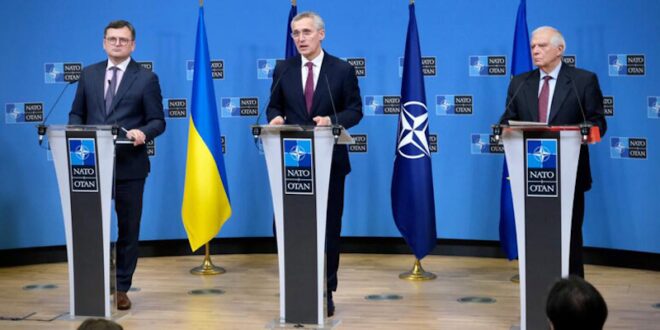Despite all the propaganda around strategic autonomy, Europe has not taken any steps toward it and with the Ukraine war, everything seems to be up in the air. This war has made Europe’s security dependence on the United States even more obvious, and Russia’s nuclear threats once again emphasize the fact that without the presence and role of the United States, Europe cannot create any deterrence (especially nuclear deterrence) against Russia.
European countries, as a coherent whole, have not made any effort to increase their defense budget and cooperation in the defense industry and the operational sector. Failure to increase military capability has been a serious blow to the EU’s strategic autonomy dream and has left Europe no way but to follow the policies and interests of the United States in the Ukraine crisis, as in previous crises.
In fact, Russia’s attack on Ukraine highlighted the inability of the European Union to deal with threats and strengthened the centrality of the United States’ political-military leadership in the security of Europe. Furthermore, Atlanticists (led by Poland) now have the upper hand in comparison with Europeanists (led by France). These developments along with the public’s distrust of their countries’ ability to secure the continent have once again revived the North Atlantic Treaty Organization (NATO) as the main provider of security in Europe. Finland and Sweden’s efforts to join NATO and the public support they received for it demonstrate how crucial this treaty has become for Europe.
Strategic autonomy could never be a framework for the European Union to become a geopolitical actor in the world of great power competition (and in the midst of the Cold War between the US and China). Europe contributed to the world’s security through its economic and supervisory power, as well as its commitment to the multilateral order. However, its share in providing security to the world has declined as a result of the Ukraine war.
Another challenge to Europe is the absence of a common strategic assessment of threats and the unwillingness of European countries to pool resources in order to deal with common challenges. In this regard, some in the West believe that Europeans should first gain strategic autonomy at the national level and then consider achieving European autonomy. In this line, military experts believe that as the first step Germany, France, Italy, and the United Kingdom should at least have 40,000 active personnel (including air, naval, cyber, space, and special operations forces). Finally, the limitations of European deterrence in the scenario of armed peace (both in terms of nuclear capabilities and the will to use these capabilities) have become more apparent.
In this situation, the only option before Europe is to try to strengthen NATO’s European pillar and become a more capable partner for the US whose priorities have shifted towards the Asia-Pacific and containment of China. This strategy might have three important consequences for Europe. Firstly, it puts Europe’s security interests and priorities below the interests of the United States. Secondly, it adversely affects Europe’s long-term focus on reducing its dependencies in the energy and technology sector. Lastly, it greatly reduces Europe’s ability to resist the unilateralism of the United States. As a result, Europe will not only forfeit its strategic autonomy but also squander its efforts to consolidate strategic and technological sovereignty. This is however desirable on the part of Washington as it needs the unswerving support of its allies to contain China. The US seems to have no qualms about sacrificing Europeans’ interests and humiliating them.The recent strict and unprecedented sanctions that the Biden administration imposed against China are a case in point as they will be costly for European technology companies. Also, in recent years and even before the Ukraine crisis, Europe had almost accepted that strategic autonomy has a long way to go, and had focused on diversifying the supply chains, reducing its energy dependence and rare earth and mineral materials, and technological advances. However, the urgent economic (and energy) pressure caused by this crisis has made Europe more dependent than before, at least in the short term. For instance, the high prices of oil and gas imported from the United States, as well as the monopoly policies of the Biden government in the field of technology and green energy.
 Eurasia Press & News
Eurasia Press & News




